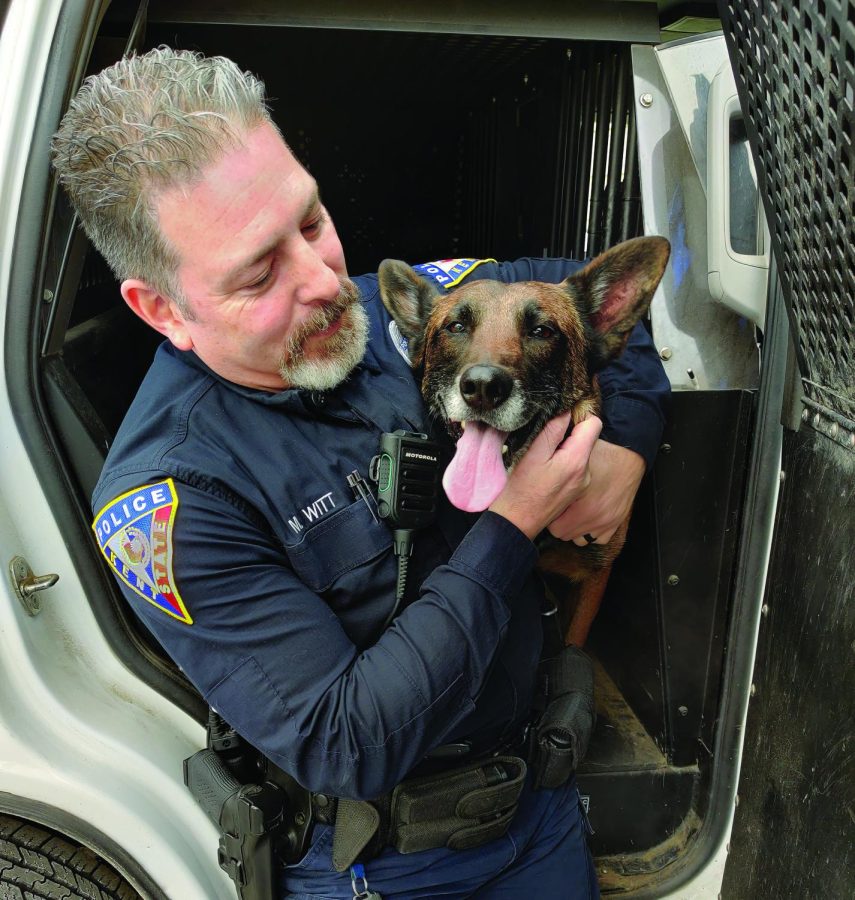From Pup to Pro: Dexter and Witt Grow Together
January 28, 2020
When Officer Miguel Witt set out to become a police officer, the only things on his mind were trying to help people in need and to make a real difference in the world. Now, seasoned with over 19 years of experience, he is working on making a difference where he can with his crime-fighting partner, Dexter.
Dexter is a Belgian Malinois who specializes in explosives detection. With a nose that is about 40 times more sensitive to odors than a human, nothing gets past this pup.
Out of Witt’s 19 years as a police officer, five of those years have been spent as a K9 handler. Since then, both he and Dexter have been through a lot trying to figure out how to become a great team, and part of being a great team is learning when to let your partner do their thing.
Witt said there were some initial hurdles when working with Dexter.
“I guess it’s the realization that your dog is actually smarter than you at this job,” he said. “The best thing you can probably do is just get out of your dog’s way.”
This was, according to Witt, one of the first real challenges he faced when working with Dexter, and it took him almost a year to fully overcome and master. Officer Anne Spahr, the first K9 handler at the Kent State University Police Department, helped Witt improve as a handler.
“They became more solid as a team, and recognising when not to get in the dog’s way,” Spahr said. “He learned to let Dexter work more independently.”
Witt stated that the first two years of working with a K9 are typically the hardest to get through. That period is all about figuring out each other’s habits, body language, and personality.
Witt is a firm believer that the dog’s personality can lend more to their job than their skill. Each dog that is a part of Witt’s training group are all highly skilled at their respective tasks. They are all around the same age and experience level. However, it is their personality quirks that either make it easier or harder to work with.
Typically, when a dog is signaling it has found something they point their nose to the source and sit. Witt describes Dexter as very animated when he is searching.
“His tail is wagging like crazy, and then when he finds something, he gets pretty deliberate. His tail slows down, and when he finds and pinpoints the odor he freezes up,” Witt said.
What counts is not how the dog alerts the officer, but the officer’s ability to recognize that their dog has found something.
Dexter, while having his own unique way of signaling, is still great at his job. And this is demonstrated annually when both him and Witt must go into their certification test.
When going to get recertified for bomb detection dogs in particular, if they miss anything they automatically fail and are not recertified. So, both Witt and Dexter must always be on their “A” game.
In order to keep their skills sharp, Dexter and Officer Witt are allowed two days out of every month for training. On the weekends, they find an empty campus building, either residence halls or academic buildings, to take Dexter into a real-world scenario where a bomb threat could be called into.
The officer would hide real explosives, that cannot be detonated, inside a room of the building. He then waits to let odors from the explosive to funnel out into the room for five to 10 minutes. Then it is Dexter’s time to shine. He goes into his “work mode” and scans each room thoroughly until he finds the room he is looking for.
During our demonstration, Witt hid the explosives inside a cardboard box sitting on top of a filing cabinet. Being that he hid it inside their records room, there were boxes and cabinets everywhere. However, for Dexter, this proved to be an easy find. He quickly scanned the room and pointed on top of the filing cabinet to the exact box it was hidden in.
After a job well done, Dexter is rewarded with his favorite chewing toy.
It took a while for Witt and Dexter to become the dynamic duo they are today. Witt has stated that for the past two years they have both been at their peak performance. They each know what the other is thinking and move together seamlessly. They aren’t bumping into each other like when they first started to work together, and they get the job done effectively.
Dexter and Officer Witt are both prime examples of how far good teamwork can take you. And while there will be good and bad days, knowing that there is someone, or some dog, that has your back can get you through anything.
Griffin White is a reporter. Contact him at [email protected].












